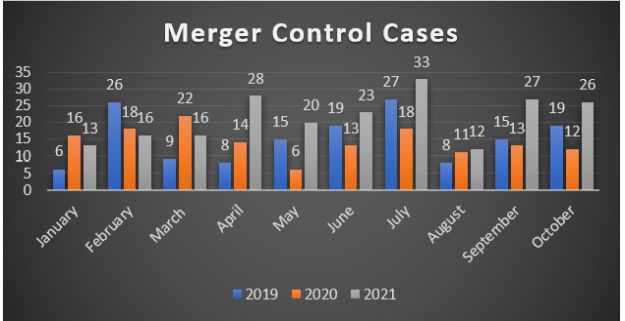November 2021 - In October 2021, the Turkish Competition Board ("Board") approved 26 merger control filings and published 33 reasoned decisions. The Board also held a long oral defence meeting that lasted from 10:30 a.m. to 02:30 a.m. the next day. We provide detailed information on this oral defence process and its implications below.

A reverse shopping spree!
The Board's investigation against retailers of food and cleaning products and their suppliers has been concluded with a jaw dropping decision. After an exhaustive oral hearing process that started at 10:30 a.m. and finished at 2:30 a.m. the next day, the Board defined the behaviour of the undertakings listed below as a "hub and spoke" type cartel and imposed an administrative monetary fine in the total amount of 2.7 billion lira (approximately USD 283 million). This decision marks the first time that the Board has imposed a monetary fine based on a hub and spoke violation. The Board decided that retailers A101, BIM, CarrefourSA, Migros and Sok Marketler violated Article 4 of Turkish Competition Law by:
- coordinating prices or price transitions directly or via mutual suppliers by way of indirect contacts;
- sharing with their competition sensitive information such as future prices, price transition dates, seasonal activities and campaigns;
- intervening with the prices of undertakings that decreased their prices or did not increase their prices during a period where prices increased on a market-wide scale via suppliers, and ensuring that prices were increased in a manner that is detrimental to customers;
- constantly preserving the collusion between undertakings through price reductions and/or penalisation strategies, such as issuing a return invoice to the supplier, which are implemented rapidly for the product and/or region when competitors do not increase their prices.
Together with the five retailers, one supplier, Savola, has also been fined based on the grounds that it openly mediated and shared competitively sensitive information such as the future prices and price transition dates of retailers. The Board decided that Savola violated Turkish Competition Law through agreements or concerted practices that appear as a hub and spoke cartel with the purpose of determining sales prices and is jointly and equally responsible with the retailers for this violation.
Oops, did they do it again?
The Board is once again considering to launch an ex-officio investigation against Sahibinden.com. Based on the information, documents and findings obtained in a preliminary investigation, the Board has indicated that it considers the findings serious and sufficient enough to launch an ex-officio investigation against Sahibinden.com, in order to determine whether there was a violation of the provision on the abuse of a dominant position regulated under Turkish Competition Law, i.e., the prevention of data transfers in terms of online platform services and by other means. Sahibinden.com has a history of struggles with Turkish Competition Law. You can read our examination on the latest decisions of the Board and judicial decisions regarding Sahibinden.com here.
Can we fly to the moon in our hot air balloon?
In late 2018, the Board initiated an investigation to look into the potential anti-competitive conduct of hot air balloon tour operators in Cappadocia, which is the most popular touristic region in Turkey. The investigation was launched based on allegations that Dorak Turizm had excluded competitors from the market by refusing to provide balloon flight services to the customers of hotels and agencies other than their own hotels and agencies.
The Board found that:
- a shared reservation pool falls under the definition of a cartel. As of January 2018, four of these reservation pools belonged to DORAK HOLDING, and 14 undertakings formed a joint sales platform named CO DMC; in other words, they created a cartel that included 55% of the reservation slots.
- the structure formed by the undertakings in this case is not similar to usual cartel structures. Usually cartels include only horizontal restrictions. However, this cartel is structured in a manner where undertakings operating at different levels of the sector come together, and vertical relations between undertakings help to ensure the operability and continuity of the cartel.
Ultimately the Board decided that the relevant undertakings violated Turkish Competition Law, as they engaged in activities regarding price determination and market sharing in the pre-CO DMC period, the creation of a joint reservation and sales platform in the hot air balloon flight services market, and/or an agreement/compliant action for price determination in the CO DMC period. This decision is expected to impact the tourism market in Cappadocia. So, next time you visit Cappadocia you can enjoy the food, wine and beautiful sight of hot air balloons flying over the valley without worrying about a cartel.
The content of this article is intended to provide a general guide to the subject matter. Specialist advice should be sought about your specific circumstances.



